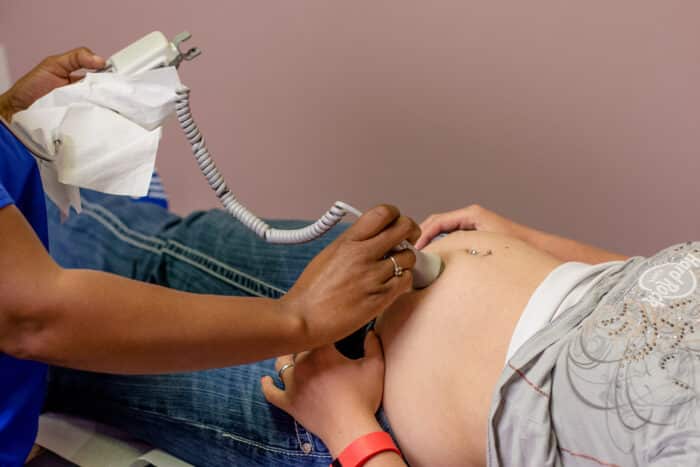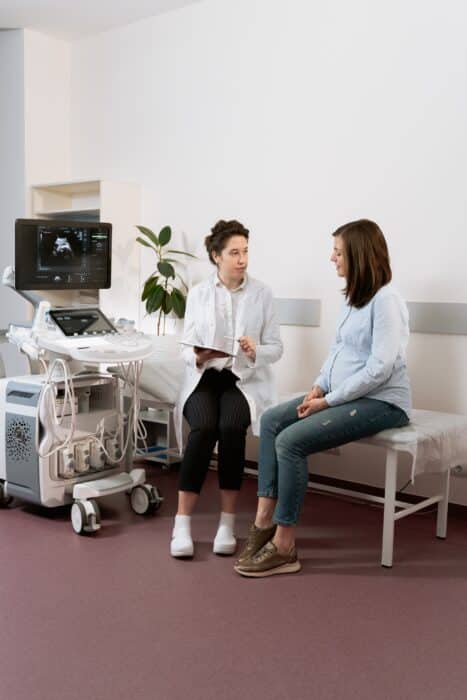Medical assistance is an evolving field that has been gaining momentum recently. The field of medical assistance is considered to be the best entry point into the healthcare industry.
According to the U.S. Bureau of Labor Statistics (BLS), this field is expected to rise by 16% by the year 2031.
If you have heard about medical assistants, you might know that there are many types of medical assistants, some of which also work in specialized settings.
A few types of medical assistants are pediatric medical assistants, OB-GYN medical assistants, and many more.
If you want to become a medical assistant and are more interested in working with delivering healthcare to women throughout their pregnancy, becoming an OB-GYN medical assistant might be your best bet.
OB-GYN medical assistants work in women’s healthcare, wherein they assist physicians, nurses, or other healthcare professionals with prenatal checkups and IUD insertions, among other tasks.
If you are interested in becoming an OB-GYN medical assistant, read on to find out everything you will need to know about what they do, where can medical assistants work, what certified medical assistants’ salary is, and how to become a Medical Assistant.
Also see: 12 Reasons to Become a Medical Assistant
Who Are OB-GYN Medical Assistants?
The full form of OB-GYN is obstetrics and gynecology. While gynecology covers care over all issues related to women (specifically reproductive organs), obstetrics involves care during the period of pregnancy and after childbirth.
OBGYN Medical assistants help doctors in such a setting.
The most common work settings for OB-GYN medical assistants are outpatient centers and women’s health clinics.
Read: National Certified Medical Assistant NCMA
What Are The Duties of an OB-GYN Medical Assistant?
The typical duties of an OB-GYN include all the regular tasks a medical assistant has to perform, in addition to some specialized tasks.
Let us look at some clinical duties of an OB-GYN medical assistant-
- Assisting Physicians with Examinations-
Typically, an OB-GYN examination or procedure involves inspecting sensitive areas, and patients might be nervous or hesitant because of that. OB-GYN medical assistants can help patients become more comfortable by assisting them with every step. - Measuring and Maintaining Patient Vital Signs-
Medical assistants need to record patients’ vitals, such as their blood pressure, temperature, and respiratory rates. This is necessary to ensure the patient receives optimum care. - Collecting Samples-
OB-GYN medical assistants might be asked to perform pregnancy tests. Apart from that, they also need to collect samples involving blood and urine for further laboratory analysis.
Also see: Can Medical Assistants Draw Blood?
- Assisting Physicians with Procedures-
Medical assistants are required to help physicians with any procedures, such as IUD insertions or pap smears. - Recording Growth Patterns and Weight During Pregnancy-
Medical assistants are required to record and update the weight as well as the belly size of a pregnant mother and their baby. This is important to ensure there are no inconsistencies with their health.
Read more about Certified Clinical Medical Assistants
Now, let’s see what the administrative tasks of an OB-GYN medical assistant look like:
- Scheduling Appointments-
Medical assistants are often the first point of contact for patients. They assist patients with setting up appointments as per the schedule of the physician.
- Answering Phone Calls-
As mentioned earlier, medical assistants are the first people patients contact while trying to get in touch with the physician. Many patients, especially pregnant women, tend to contact their obstetricians throughout their pregnancies.OB-GYN medical assistants need to be on alert in case of any emergencies and relay all queries and information to the physician and vice versa.
- Maintaining Office Supplies-
One of the main tasks of a medical assistant is to maintain office supplies and keep an inventory of stocks. This helps in the smooth running of the clinic or office. - Greeting Patients-
Medical assistants are usually the first person a patient sees when they enter the clinic or the office for their appointment.
Read more about Medical Administrative Assistants
Where Do OB-GYN Medical Assistants Work?
As mentioned earlier, OB-GYN medical assistants usually work at outpatient centers and women’s health clinics. They also have the option of working in other healthcare settings, such as large hospitals or smaller private offices.
Some medical assistants can also be found working in community health clinics, serving the underserved population.
What Are The Skills Required to Become an OB-GYN Medical Assistant?
OB-GYN medical assistants are the core members of a healthcare system. Since their duties involve both clinical and administrative tasks, they need to have a specific set of skills to ensure optimum care delivery for patients.
Let us take a look at some of the most important medical assistant skills working in an OB-GYN clinic needs to possess:
- Critical Thinking-
Critical thinking is one of the most essential skills every individual working in healthcare needs to possess. OB-GYN medical assistants need to be aware of how to handle emergencies and solve issues quickly. - Medical Vocabulary-
Medical assistants working in healthcare settings need to know basic medical assistant terminology. This helps in smooth communication with physicians as well as patients. - Basic Computer Skills-
The administrative side of medical assistance requires you to have basic computer skills. This comes in handy when you need to document an electronic health record or maintain and update a patient medical history. - Phlebotomy Skills-
Drawing blood is one of the most important and common tasks of a medical assistant. OB-GYN medical assistants need to know the basics of drawing blood, as this activity is quite common in obstetric clinics. They need to be able to draw blood without causing any injuries or infections. You can take a course on phlebotomy to help you develop and perfect this skill. - Organizational Skills-
Medical assistants are usually multitaskers, wherein they adhere to both clinical and administrative tasks and also greet and direct patients. Organizational skills are very important to be able to handle all of these tasks efficiently. - Dexterity-
Medical assistants often have to assist physicians with bedside procedures or examinations, so they need to be able to handle delicate instruments while maintaining sterilization.

Do You Want To Become a Medical Assistant? Check Out Free Medical Assistant Masterclass!
In our masterclass you learn:
- How to be a medical assistant faster…in just 4 months!
- Avoid student debt & driving to classes
- #1 thing employers want from Medical Assistants
- How to stand-apart & get a university certificate for a strong resume
Inner Workings of an OB-GYN Office
As a medical assistant, if you want to work in an OB-GYN office, you might be wondering what all it entails.
Apart from the two common goals that this specialized field of healthcare aims for, which is the general improvement of women’s health and assisting women with the childbirth process, they also tend to focus on sexual health.
OB-GYNs often help women with different aspects of reproduction, such as ovulation, sexual health screenings, and birth control. This helps women lead much safer and healthier lives.
Medical assistants who want to work in this specialized field of healthcare need to be compassionate, patient, and passionate about assisting women in achieving better health.
How Much Do OB-GYM Medical Assistants Earn + What is Their Job Outlook?
According to the U.S. Bureau of Labor Statistics (BLS), the national average salary for medical assistants across the country was reported to be $37,190 or $17.88 per hour.
These figures, however, are dependent on a variety of factors and are subject to change according to the location of the job, experience, level of education, etc.
While there is no government data available for OB-GYN medical assistants and their average salaries, they are expected to earn around $37,000 annually, according to job board sites such as salary.com.
The medical assistant job outlook looks significantly positive for the upcoming years, and the BLS has reported that job growth is expected to rise by 16% by the year 2031, which is much higher than any other profession.
Also see: How to get Medical Assistant jobs with no experience
How To Become An OB-GYN Medical Assistant?
If you are still here, you might be wondering what the process of becoming an OB-GYN medical assistant involves. You will be pleased to know that becoming one is not that hard, even though it might seem intimidating at first.
Let’s take a look at the medical assistant educational requirements for OB-GYN medical assistant-
1. Complete your high-school diploma or a GED-
Even though degrees are not required to become a medical assistant, the minimum requirement you will need to meet is to complete your high school diploma or a GED.
Read more on: Medical Assistant Degree vs Certificate
2. Choose a training program-
After you have attained your high school diploma, you will need to choose and complete medical assistant training.
There are three main methods of completing your training, getting an associate’s degree from a university, getting a diploma from a community college, or opting for an online training program.
Also read: Is Medical Assistant School Hard?
Choosing an online training program is considered to be the most recommended method of completing your training due to the several advantages it offers over its alternatives. The advantages include-
- Being able to complete your training faster, in as little as 6 months.
- It costs significantly less than its alternatives allowing you to avoid taking the burden of an education loan, with tuition costs only around $5000 (Read more: Medical Assistant Programs Cost)
- Allows you to learn at your own pace and schedule, and the comfort of your own home.
- Also allows you to prepare for certification exams.
Also see: Is Medical Assistant Degree Required?
3. Get Certified as a medical assistant-
While not necessary, employers highly prefer candidates that obtain their certification.
See also: Medical Assistant Certificate Requirements
The most recommended and common certification exams for medical assistants are the CCMA exam held by the NHA and CMA exam held by the AAMA.
Read more: Which Medical Assistant Certification is the best?
4. Apply for jobs and start your career.
After you have obtained your certification, you can start applying for medical assistant jobs.
See more on: Medical Assistant Career Path
As you start working as an OB-GYN medical assistant, you will also have the option of advancing your career and becoming a medical assisting officer or the lead medical assistant.
Also see: Is Medical Assistant a Good Career?
Conclusion
In conclusion, an OB-GYN medical assistant plays an important role in the specialized field of women’s health. Their diverse skills, from administrative tasks to direct patient care, ensure the smooth operation of OB-GYN offices.
These professionals assist in examinations, support procedures, handle patient records, and offer crucial support to both healthcare providers and patients. Their dedication contributes significantly to the quality of care in obstetrics and gynecology, making them invaluable team members in enhancing women’s health experiences.
Other Medical Assistant FAQs
What is a Medical Assistant? And what do they do?
A medical assistant is a crucial member of a healthcare team who performs both administrative and clinical tasks. They work in various healthcare settings like clinics, hospitals, or doctors’ offices.
On the administrative side, they handle tasks like scheduling appointments, managing patient records, and billing. In a clinical capacity, they assist doctors during exams, take vital signs, prepare patients for procedures, draw blood, conduct basic lab tests, and even help explain treatments or medications to patients. Their versatile role helps ensure the smooth running of medical offices while providing essential support to healthcare providers and patients alike.
Related Resources:
- Medical Assistant Programs
- CMA vs. CNA
- How Long Does it Take to Become a Medical Assistant?
- Medical Assistant Job Duties
- CMAA vs CCMA
- Military Medical Assistant
- Medical Assistant On-the-Job Training
- Medical Assistant vs EMT
- Accelerated Medical Assistant Program
- Certified Medical Assistant
- Medical Assistant Degree Online 6 Weeks
- 4 Week Medical Assistant Program
- Cheapest Medical Assistant Program
Related Articles
-
How to Be Successful in College in 2022 – 7 Simple Tips to Succeed
-
How Do Scholarships Work? Read This First…Truth is Shocking
-
7 Best College Majors 2024: What Should I Major In?
-
How to Choose a College – 10 Things You Must Consider in 2024
-
Why Go to College? Top 13 Benefits for Adult Students in 2022
-
Top 5 Best Alternatives to Community College for 2024










